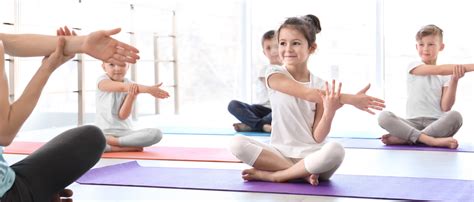Yoga’s Role in Enhancing Children’s Mental Health: A Comprehensive Analysis
Yoga, an ancient practice with deep roots in Indian philosophy, has grown in popularity in the West due to its holistic benefits. Among its many advantages, yoga is particularly effective in improving mental health. While the practice is often associated with adults, research is increasingly demonstrating its potential for positively influencing the mental well-being of children. This article delves into how yoga impacts mental health in kids, offering a comprehensive overview of its benefits, practical applications, and implications for the future.
Introduction
In today’s fast-paced world, children face various stressors—from academic pressures to social challenges. As mental health concerns among children rise, educators and parents are searching for effective tools to help kids manage stress, anxiety, and emotional regulation. Yoga is emerging as one such tool. But how does yoga truly benefit the mental health of children? This article explores the mechanisms through which yoga enhances psychological well-being, provides evidence-backed case studies, and presents guidelines for integrating yoga into children’s daily routines.
Key Concepts
- Mental Health: A state of well-being where individuals can cope with stress, work productively, and contribute to their communities.
- Mindfulness: A practice of staying present and aware of one’s thoughts, feelings, and environment without judgment.
- Emotional Regulation: The ability to manage and respond to emotional experiences in a balanced way.
- Neuroplasticity: The brain’s ability to adapt and change in response to experience, which yoga and mindfulness practices are believed to enhance.
- Resilience: The capacity to recover from difficulties and maintain mental well-being.
Historical Context
Yoga dates back over 5,000 years, with its roots in ancient India. Traditionally, it was practiced to unite the mind, body, and spirit. However, in the modern context, yoga has evolved into a more physical practice, often emphasizing its benefits for flexibility and fitness. Only recently has its role in mental health come to the forefront, particularly in how it affects the developing minds of children.
Historically, yoga was practiced by adults, but over the past few decades, educators and healthcare providers have increasingly turned to yoga as a therapeutic tool for children. In the 1970s, Dr. Swami Satyananda pioneered the idea of teaching yoga to children, emphasizing the practice’s potential for emotional regulation and stress relief. By the early 2000s, yoga programs were being integrated into schools, and research began focusing on its psychological benefits for children.
Current State Analysis
Today, yoga is widely acknowledged as a powerful tool for mental well-being, especially in children. Numerous studies support its efficacy in reducing symptoms of anxiety, depression, ADHD, and autism spectrum disorders (ASD). According to a 2020 report from the Centers for Disease Control and Prevention (CDC), about 1 in 6 children aged 6-17 experienced a mental health disorder. The increased pressure on educational systems to address these issues has led to a surge in the popularity of mindfulness and yoga programs within schools.
Key Mental Health Challenges in Children
- Increased prevalence of anxiety and depression
- Academic and social pressures
- Lack of emotional regulation
- Attention and focus issues
Yoga’s Mechanisms for Mental Health Improvement
- Breath Control (Pranayama): Teaching children how to regulate their breath can lower cortisol levels, leading to reduced stress and anxiety.
- Mindfulness and Meditation: Yoga helps kids develop mindfulness, promoting focus and self-awareness.
- Physical Movement (Asanas): Physical postures in yoga not only improve flexibility but also encourage mind-body awareness, which contributes to emotional regulation.
- Positive Psychology: Yoga fosters a positive mindset through affirmations and self-compassion, crucial in building resilience in children.
Practical Applications
Yoga can be easily integrated into a child’s daily routine, whether at home, in school, or in extracurricular activities. Below are some key methods for doing so:
- Classroom Yoga Sessions: Incorporating short yoga sessions in the classroom helps kids refocus and de-stress during the day.
- Morning Routines: Starting the day with mindful stretching and breathing sets a calm tone for the rest of the day.
- Post-Homework Break: A 10-minute yoga session after school helps children transition from academic tasks to relaxation, promoting mental clarity.
Case Studies
| Case Study | Outcome |
|---|---|
| School-Based Yoga Program in New York City (2019): A public school introduced 20-minute yoga sessions twice a week for third-graders. | Students exhibited a 30% reduction in anxiety levels and an improvement in focus and classroom behavior. |
| Mindfulness and Yoga in ADHD Therapy (2021): Children diagnosed with ADHD participated in an 8-week yoga program that combined mindfulness and yoga. | Results showed significant improvements in attention span, emotional control, and reduced hyperactivity. |
| Yoga for ASD Children in California (2018): A specialized yoga program was introduced to help children on the autism spectrum improve emotional regulation. | Parents reported a decrease in aggressive behavior and meltdowns, while children displayed increased social interaction. |
Stakeholder Analysis
Understanding the different stakeholders involved in implementing yoga programs for children is essential for success. Below is a breakdown of key stakeholders:
- Parents: Primary caregivers who can support yoga practices at home and advocate for programs in schools.
- Teachers: Play a vital role in integrating yoga into the classroom and creating a supportive environment for students.
- School Administrators: Responsible for approving and allocating resources for yoga and mindfulness programs.
- Healthcare Providers: Pediatricians and mental health professionals can recommend yoga as a complementary therapy for managing conditions like anxiety, ADHD, and depression.
Implementation Guidelines
For successful implementation, schools, parents, and healthcare providers need a clear roadmap. Here are some guidelines:
- Start Small: Introduce short, 10-15 minute sessions to prevent overwhelm.
- Tailored Programs: Customize yoga practices based on the child’s age, needs, and mental health condition.
- Consistency: Ensure regular practice to allow children to experience long-term benefits.
- Training for Instructors: Yoga instructors must be trained in child development and mental health to provide appropriate guidance.
Ethical Considerations
While the benefits of yoga for children’s mental health are clear, several ethical considerations must be addressed:
- Cultural Sensitivity: Yoga’s roots in Indian culture must be respected, avoiding cultural appropriation in its implementation.
- Consent: Parents and children should give informed consent before starting yoga programs, understanding both benefits and limitations.
- Inclusivity: Yoga should be accessible to children of all abilities, including those with physical or cognitive challenges.
Limitations and Future Research
While yoga shows promise as a tool for improving children’s mental health, several limitations exist. Current research largely focuses on short-term benefits, and there is a lack of long-term studies tracking the sustained impact of yoga on children’s mental well-being. Future research should aim to:
- Explore the long-term effects of consistent yoga practice on children’s mental health.
- Investigate how different types of yoga practices (e.g., asanas, pranayama, meditation) affect specific mental health outcomes.
- Examine the role of yoga in managing severe mental health conditions such as trauma or chronic depression in children.
- Develop frameworks to ensure yoga practices are inclusive, culturally sensitive, and scalable for wider application in schools and communities.
Expert Commentary
The role of yoga in improving children’s mental health is undeniable, but it’s not a one-size-fits-all solution. Experts agree that yoga is an excellent complement to other therapeutic strategies, offering a holistic approach that integrates physical, emotional, and mental well-being. Dr. Susan White, a child psychologist, states, “While yoga may not cure conditions like








